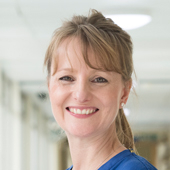Biography
Dr Rebecca Lane studied at St George’s Hospital Medical School, graduating in 1997 and went on to complete her training in general medicine, general cardiology, interventional cardiology, heart failure, pacing and complex device implantation at St. Mary’s West Hertfordshire and Harefield Hospitals.
She completed her MD research at St Mary’s Hospital, London and received the Certification for Cardiac Device Specialists from the Heart Rhythm Society in 2008.
Areas of expertise
Dr Lane is a consultant adult cardiologist with specialist training in coronary intervention (angioplasty and stenting) and implanting devices such as pacemakers and cardioverter defibrillators.
She is part of the primary angioplasty team treating patients with acute myocardial infarction. She also treats a wide range of common cardiac problems including:
- chest pain
- breathlessness
- palpitations
- dizziness and blackouts
- valvular heart disease
- hypertension
- elevated cholesterol levels.
Dr Lane also deals with general cardiology as well as interventional cardiology, heart failure and complex implant devices.
Research interests
Dr Lane’s main research interest is the assessment and optimisation of cardiac dyssynchrony in patients with heart failure before and after cardiac resynchronisation therapy, and in the risk assessment of sudden cardiac death.
She has presented her research work at numerous national and international meetings and was a guest faculty member at the Euro Percutaneous Coronary Intervention meeting held in Barcelona in 2009.
Teaching
She is the clinical lead for training Imperial College undergraduate medical students at Harefield Hospital.
Publications
Dr Lane has contributed to 'Cardiac Pacing and Defibrillation: all you wanted to know', published by Blackwell.
Private patient referral
If you would like to make an appointment with this specialist for private care, contact the RB&HH Specialist care team.

